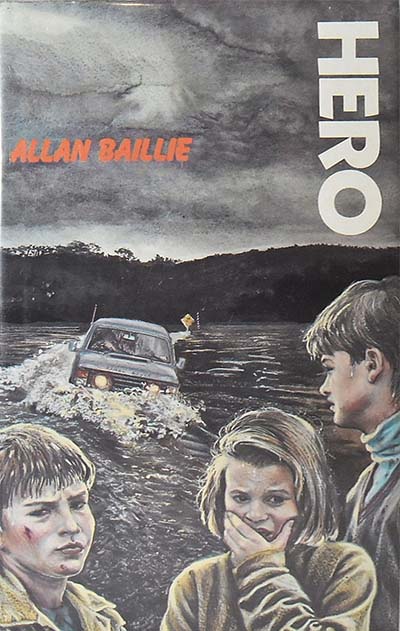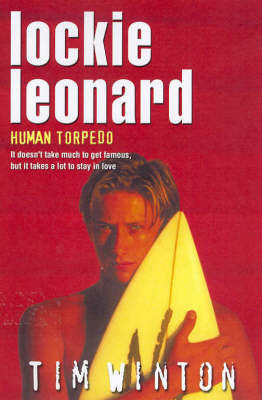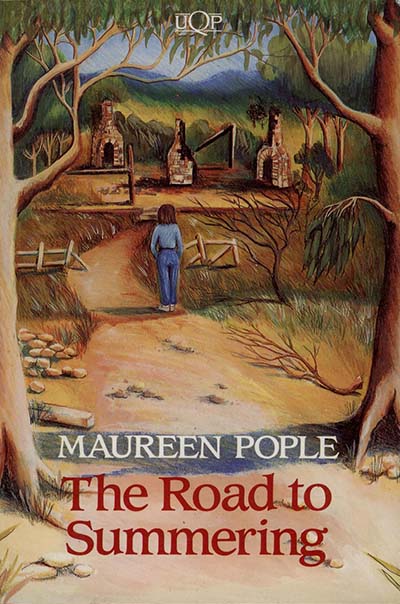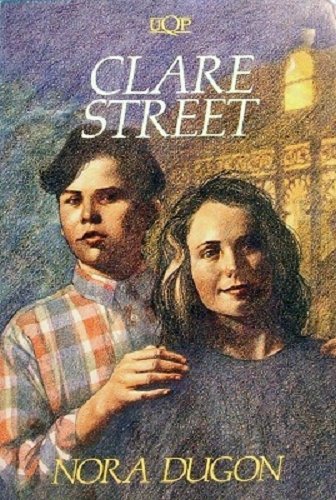- Free Article: No
- Contents Category: Children's Fiction
- Review Article: Yes
- Article Title: Four Kid's Books
- Online Only: No
- Custom Highlight Text:
Hero, Allan Baillie’s sixth novel for young readers, shows this seasoned storyteller at his best. Succinct yet incisive, it is a highly disciplined display of how tight technique can turn a single incident into an exciting story. Right from the first line, ‘A single drop of water exploded on Pamela Browning’s open exercise book’, we know we are on the precipice of an event towards which every mumble on the earth and rumble in the sky lead.
Baillie allows himself no tangential whimsy. Hardly a line is superfluous as the three young people are drawn together, along separate routes, towards the climax. Brief incursions into the thoughts of each are never just ‘by the way’: Darcy’s self-doubt brought about by a hopeless home life which has made him see himself as a loser, Pamela’s superficial values (which she inherited from her parvenu pater) put to the test, and the snug yet exacting home life of Barney, the boy from the farm who seems to have it all.
 Hero by Allan Baillie, Viking, 141 pp, $16.99 hb
Hero by Allan Baillie, Viking, 141 pp, $16.99 hb
These are all crucial driving tensions that will make the ball bounce a particular way when the moment of crisis comes.
The action of the book takes place over only a few hours. This suits Baillie’s style well. The reader is drawn into the tension through small details experienced from inside the very skin of each character, ‘fingers curling round the thick grips’ or ‘rubber boots squeaking on the gravel’. It makes absorbing reading and, as the tension builds and the flood waters rise, Baillie draws all the elements together with masterful control, not disallowing the odd flash of brilliance: ‘Darcy pulled back on the handlebars to rear the bike, a skeletal silver horse, before the rolling purple clouds and the torn lightning.’
You can expect positive action and selflessness to win out in a Baillie book and selfishness and greed to get a good rap over the knuckles but, if there’s a hand guiding the action, it is never visible. The characters are plausible and their responses to the tightly scripted action are believable. The voice of Allan Baillie never has to fill in what the writer Allan Baillie omits. You may accuse him of being moralistic, laugh at his traditional values, decry his plots and twists as manifest, but you won’t feel cheated. From beginning to end you are in the hands of a storyteller, getting better and better at what he does.
Perhaps Tim Winton felt none of these writerly restraints when he embarked on his second book for young readers, Lockie Leonard, Human Torpedo (McPhee Gribble, 132 pp, $8.99 pb). Here we have a series of puberty vignettes, loosely strung together around a plot which is so obviously a vehicle to thrash a moral stance that every kid in Australia will surely see through it.
 Lockie Leonard, Human Torpedo by Tim Winton, McPhee Gribble, 132 pp, $8.99 pb
Lockie Leonard, Human Torpedo by Tim Winton, McPhee Gribble, 132 pp, $8.99 pb
Lockie Leonard is a frighteningly sophisticated thirteen-year-old, mouthing such words of wisdom as, ‘Well, believin’ those things [religion] helps me believe in love.’ And again: ‘But you’re the one who’s scared of love, Vick. I don’t know anything about sex and you don’t know anything about love.’ When his girlfriend puts her nipples on his belly in an attempt at seduction, Lockie sounds like John Wayne: ‘You don’t need to do this.’
And while on the subject of nipples – ‘jugs’, ‘norks’, ‘knockers’, ‘boobs’, and ‘bosoms’. And ‘tits’ too. And there’s a breast ‘sticking out like an iced bun’. I wondered in this proliferation of female genitalia (we even get a vulva used as a curse: ‘You bunch of yellow vulvas!’), why couldn’t I find any penises? Not even a dick. Oh there’s a ‘dickhead’ and a ‘prick’ as terms of endearment or abuse, but when referring to male genitalia we have ‘gonad-secretion zone’ and ‘business bits’, even ‘tricky bits’, but no penises that I could hunt out, although the organ itself is more active than Etna ever was.
But I digress – which is precisely what Lockie Leonard is about. Bobbing up in this stream of wet dreams we get God, girls, church surfing, and another go at the garden of Eden. This time Adam (Lockie Leonard) tells Eve (Vicki Streeton) to get behind him. As a reward he gets to catch a big wave: ‘He fell to his knees on the sand and yelled: “Thank yooooooou!”’.
Winton can be very funny. Such lines as ‘You really had to think DOG before going in’, describing the boy’s smelly bedroom and the wisecracks he hands Lockie to toss back at a dull witted teacher display much laconic wit.
But after following Lockie Leonard in and out of temptation, despite the storyteller’s obvious affinity with thirteen-year-old boys, words like contrived, predictable, and trite spring to mind. It is too obviously guided by the hand of all that’s right and good: a series of good jokes and little lessons strung together to prove that parenthood, God, feeling inside girls’ bras, and surfing are ‘orright’, and smoking, being rich, and sex involving ‘tricky bits’ below the waist are as bad as bogans.
One could never doubt for a moment that Winton has something to say, but here his desire to say it seems to far outweigh his desire to fulfil the most basic obligations as a writer.
The blurb on the cover of The Road to Summering (UQP, 144 pp, $9.95 pb) tells us that ‘Mac Huntley has left his wife and children to live with the artistic Caroline Summers, but why so suddenly, when she’s only been in town for two days?’. The answer to that question is about as mysterious as a ball bearing, but Maureen Pople intrepidly prattles her way through 144 pages and makes it into a book.
 The Road to Summering by Maureen Pople, UQP, 144 pp, $9.95 pb
The Road to Summering by Maureen Pople, UQP, 144 pp, $9.95 pb
Here’s Mac Huntley paraphrasing Aristophanes: ‘So Zeus decided to cut each creature in two … And now all those halves wander through the world, seeking one another. Maybe that’s what love is, longing for the half of ourselves we have lost.’
Dad couldn’t help himself, you see. Through a convenient crisis, even the old wife and the new woman come to an understanding: ‘Caroline and Janet smiled at each other across the bed, and Rachel realised that some sort of truce had been arrived at. It seemed to her that both his women knew Mac Huntley extremely well.’
Rachel, his daughter, forgives him too and so, in the end, all his women understand.
This regrettably insubstantial plot is abetted by the introduction of a whole parade of characters who seem to have very little to do with anything, except that they live in the town:
Her eyesight was bad, so she had volunteered to stay at home, and the poor wife knew that both the children would already be showing the first signs of dental caries because of the rich food the old lady would have been plying them with, to say nothing of the threat to their personalities from watching a night of violence on television.
Do we really need to know this about a volunteer in a search party whom we never hear of or see again?
Although the first half of the book trundles along reasonably well, the last few chapters of The Road to Summering disintegrate into a total fiasco when the whole town rallies to jerk young brother George from the coma which he copped when he ran away from home and fell off his bike. It reads like the final number of the Christmas Extravaganza of Young Talent Time, with each step described in painful detail.
Regrettably too, this book represents a sad slip in the taste department for UQP covers, previously far and away the most innovative and appealing – Nora Dugon’s Clare Street (UQP, 192 pp, $9.95 pb) is a more successful example.
 Clare Street by Nora Dugon, UQP, 192 pp, $9.95 pb
Clare Street by Nora Dugon, UQP, 192 pp, $9.95 pb
Although problems endemic to the state of late teenager-hood, such as isolation, identification, and occupation, are tackled in Clare Street, Nora Dugon steers as clear of simple solutions as she does of a happy ending where all is safely ensconced in a protective family group. On the contrary, the sequel to Lonely Summers is a turmoil of physical and emotional worlds in a constant state of flux. At the end of the story, teenage Kelly thinks that ‘nothing is certain, but the world seemed to her, at that moment, to be young and happy and rich with hope’, which epitomises Dugon’s tone throughout. While always ready to pull the rug out from under, she nevertheless takes a thoroughly chirpy perspective of life’s little comings and goings.
At worst, Dugon’s second book for young adults reads like a dozen or so episodes of Neighbours, a gossipy slice from the larger lamington of a suburban street. At best its subtle characters and their problems are very identifiable, although there are so many of both in this busy book it is difficult to ever really come to grips with any of them.
Indeed, Clare Street flicks past like a series of stills. The photographer has caught some revealing gestures and expressions but rarely shows any but the most front-on perspective. This is a pity, because in describing the daily movements in Clare Street, Dugon’s insights often go much deeper than mere documentation of obvious responses and cliched behaviour.
And what a hive of activity this street is! A dog is lost, a boy runs away from parents who don’t understand, dog is found, boy is found by more understanding grandmother, single mother battles on, capitalist expands, all hope is lost, real estate values go up, rich kids have messy rooms, all hope is found. And so on.
Embedded in all this chatter is the sensitive portrayal of a worthy young girl’s tentative infatuation with an unworthy young man, with a more worthy young man bobbing on the distant horizon. But that’s only Miranda and Ferdinand. There’s a whole legion of extras bumping into each other in the wings and enough issues to write twenty comedies and tragedies. Many interesting asides are left to dangle untidily like loose threads on an otherwise complete tapestry.
Dugon’s prose is as lucid as the dialogue is plausible, but Clare Street boasts the most excessive use of emphasis I’ve ever seen: ‘To be somebody you had to belong, you had to be in with the crowd.’ Sentences with this heavy-handed underscoring, appearing sometimes two or three to the page, not only add to the gossipy tone, but are also a constant irritation to an otherwise comfortable read.


Comments powered by CComment